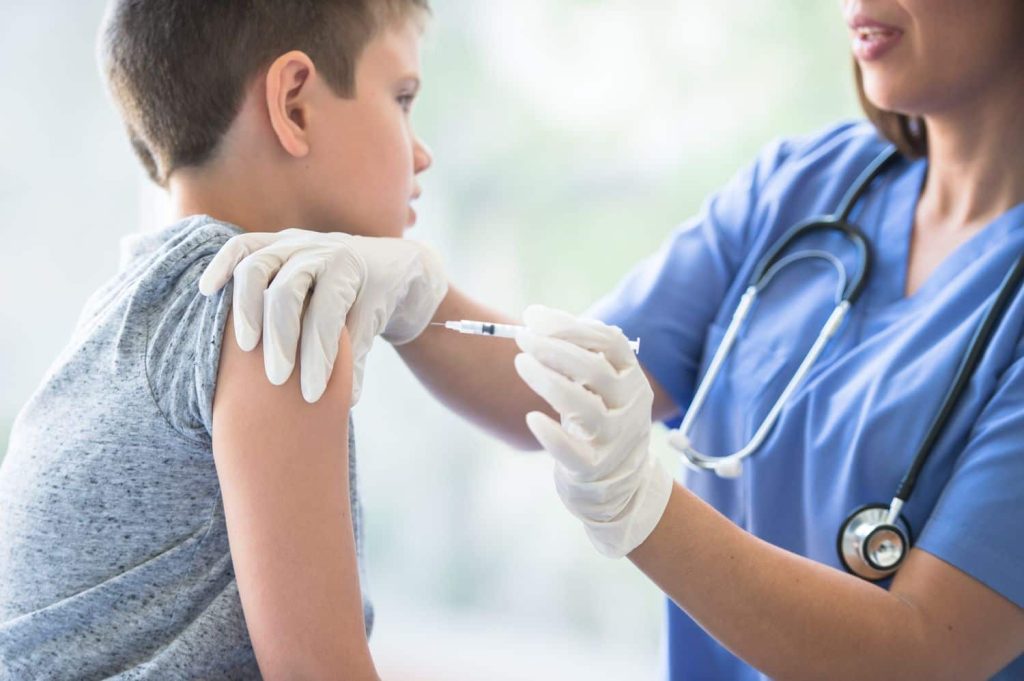Haemophilus influenzae type b (Hib) is a bacterium that can cause serious illnesses, primarily in children under 5 years of age. Before the introduction of the Hib vaccine, Hib was the leading cause of bacterial meningitis (inflammation of the membranes surrounding the brain and spinal cord) in young children.

Understanding Hib Infection
Hib can live in the nose and throat of healthy individuals without causing any harm. However, it can sometimes spread to other parts of the body and cause invasive disease, including:
- Meningitis: Infection of the lining of the brain and spinal cord
- Pneumonia: Infection of the lungs
- Epiglottitis: Infection of the epiglottis (the flap of tissue that covers the windpipe)
- Septic arthritis: Infection of a joint
- Cellulitis: Infection of the skin and tissues beneath the skin
- Bloodstream infections (bacteremia)
Hib Infection: Symptoms
Hib infection can have a range of symptoms, depending on the site of infection.
- Fever
- Irritability
- Lethargy (lack of energy)
- Poor feeding
- Vomiting
- Stiff neck (in meningitis cases)
- Difficulty breathing (in pneumonia or epiglottitis cases)
- Joint pain and swelling (in septic arthritis cases)
- Redness and swelling of the skin (in cellulitis cases)
Note: Symptoms in infants and young children might be subtle, making early diagnosis challenging.
Hib: Transmission and Risk Factors
Hib is spread through respiratory droplets when an infected person coughs or sneezes. Close contact with infected individuals, especially in households or childcare settings, increases the risk of transmission.
Factors that increase the risk of severe Hib disease include:
- Age: Children under 5 years old, especially those under 18 months, are most susceptible.
- Lack of Hib vaccination: Children who have not been vaccinated or haven’t received the full series of Hib vaccines are at higher risk.
- Weakened immune system: Children with certain medical conditions, such as sickle cell disease, HIV infection, or those who have had their spleen removed, are more vulnerable to severe Hib infection.
Preventing Hib: Vaccination Is Crucial
The Hib vaccine is highly effective in preventing Hib disease. It’s routinely given to infants and young children as part of their routine immunization schedule.
In many countries, the Hib vaccine is included in a combination vaccine that also protects against other diseases, such as diphtheria, tetanus, pertussis, and polio.
The recommended Hib vaccination schedule usually involves:
- First dose at 2 months of age
- Second dose at 4 months of age
- Third dose at 6 months of age (sometimes)
- Booster dose at 12-15 months of age
MedicW Recommendations: Essential Supplies for Hib Infection Management
- Sampling Swabs: MedicW supplies high-quality nasopharyngeal swabs for collecting samples to test for Hib bacteria, aiding in accurate diagnosis.
- Syringes: Crucial for administering antibiotics and other medications required to treat Hib infections.
- Respiratory Protection: Masks (especially N95 respirators) are essential for healthcare professionals and those caring for infected individuals to prevent the spread of Hib through respiratory droplets.
Hib Infection: Treatment
Hib infections are typically treated with antibiotics:
- Intravenous antibiotics: Severe Hib infections, such as meningitis, are often treated with intravenous (IV) antibiotics in a hospital setting.
- Oral antibiotics: Less severe infections, such as ear infections or pneumonia, may be treated with oral antibiotics.
- Supportive care: This includes measures to manage fever, pain, and dehydration, such as fluids and rest.
Hib: Frequently Asked Questions
1. What are the long-term effects of Hib meningitis?
Answer: Hib meningitis can have serious long-term effects, including hearing loss, brain damage, seizures, and developmental disabilities.
2. Can I get Hib infection even if I’ve been vaccinated?
Answer: The Hib vaccine is highly effective, but it is not 100% protective. In rare cases, vaccinated individuals can still develop Hib infection, although it’s usually milder than in unvaccinated individuals.
3. What should I do if I suspect my child has Hib infection?
Answer: If your child develops symptoms suggestive of Hib infection, especially fever, irritability, lethargy, or stiff neck, seek immediate medical attention.
4. How is Hib infection diagnosed?
Answer: Hib infection is diagnosed through a combination of physical examination, medical history, and laboratory tests. Samples of blood, spinal fluid (in cases of suspected meningitis), or other body fluids can be tested for the presence of Hib bacteria.
5. Are there any measures I can take to prevent Hib infection in my child besides vaccination?
Answer: While vaccination is the most effective way to prevent Hib, other measures include good hygiene practices, such as handwashing, covering coughs and sneezes, and avoiding close contact with sick individuals.
6. Can adults get Hib infection?
Answer: Adults can get Hib infection, but it’s less common than in young children. Adults with weakened immune systems are more at risk.
Hib: Conclusion
Hib infection is a serious illness that can have devastating consequences, particularly in young children. Vaccination is a safe and highly effective way to prevent Hib disease. Ensure that your child receives the Hib vaccine according to the recommended schedule. Early diagnosis and prompt treatment with antibiotics are essential to minimize complications and improve outcomes.
MedicW’s medical consumables play a vital role in supporting healthcare providers in the diagnosis, treatment, and management of Hib infection.
We strongly recommend:
- Vaccinate your child against Hib.
- Practice good hygiene to prevent the spread of respiratory infections.
- Consult a healthcare provider if you suspect Hib infection.
By promoting vaccination and providing essential medical supplies, we can help protect children from this potentially life-threatening disease and contribute to a healthier future.
MedicW is committed to being your trusted partner in providing high-quality medical consumables. Explore our comprehensive range of products and discover how we can support your healthcare needs. Visit us at medicw.com or contact our team at [email protected].
Link to this article: Haemophilus Influenzae Type b (Hib) Infection
